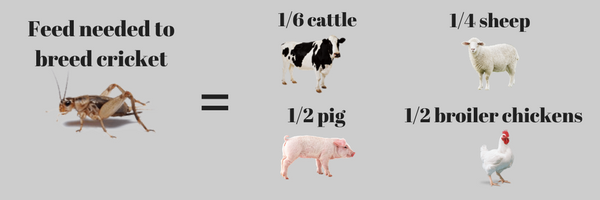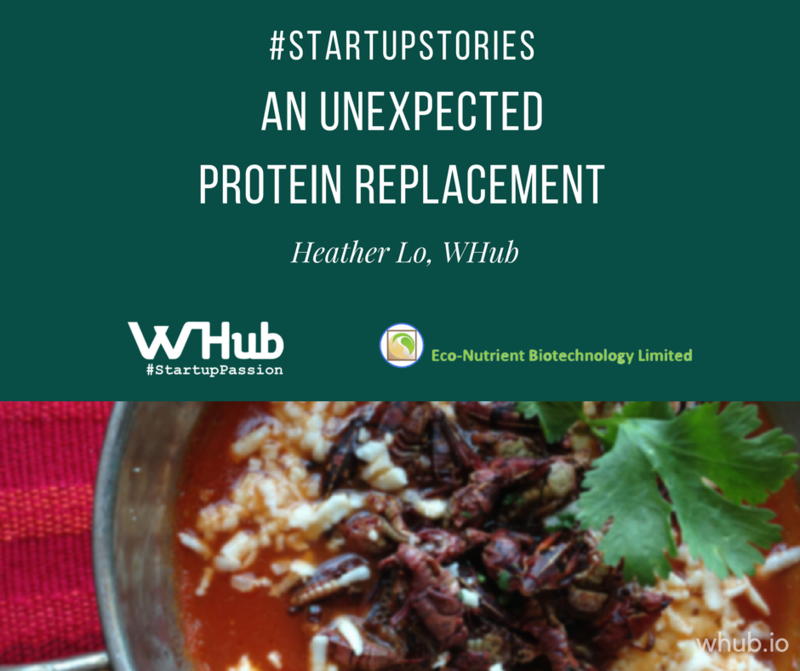

An Unexpected Protein Replacement
An interview with Ernest Ming, Eco-Nutrient Biotechnology Limited
Eco-Nutrient Biotechnology Limited, one of the alumni of SOW Asia's i2i accelerator program, wants to make nutrients sustainable for the world of today by investigating in sustainable nutrients. We had a chat with them to learn more about the nutrient sustainability problem and their passion towards solving the big pain for the Earth.
During our interview with Ernest Ming, CEO at Eco-Nutrient Biotechnology Limited, he mentioned that food security will be one of the biggest issues for the globe in the upcoming years.
Right now, freshwater, oceans, forests and biodiversity are being rapidly degraded. Climate change and natural disasters are putting more pressure on the natural resources we depend on. The exponential growth of global population deepens the concern of food security and nutrient sustainability. Do you know that, along with the billions of animals raised annually for food and as pets? According to a report from the Food and Agriculture Organization of the United Nation (FAO), the food demand is predicted to increase 70% by 2050[1]. If we keep consuming natural resources the way we do now, we would need the equivalent of 2.6 Earths to fulfill our need for resources!

Therefore it is time to rethink the way we grow and consume our food. We have done some research on how to solve the problem, and here is the conclusion:
1. Increase the supply in animal
According to the FAO, 75 percent of the world’s food is generated from only 12 plants and five animal species, pig, chicken, cattle, sheep and goat.[2] So what if we increase the amount of animal available in the market?
Yet, if we think of the trophic level, as the more move up from the food chain, the more energy we will be wasting. By shortening the food chain, there is less energy in the conversion from one trophic level to the other. Producing 1 kilo of rice, for example, requires about 3,500 liters of water, 1 kilo of beef some 15,000 liters.[3] As only about 10% of the energy in producers is passed on to primary consumers, and only about 10% of the energy in primary consumers is passed on to secondary consumers, we can achieve higher efficiency in energy consumption if we stick to consumer products from a lower trophic level.
2. Expand our nutrient resources
In recent years, the United Nation and governments around the globe are taking the problem of nutrient sustainability very seriously. According to a report from the United Nation, the best feed to feed the 9 billion people by 2050 could be to using insects as a major industrial food source, since insects breed fast.
Insect eating may sound disgusting in some countries, yet there are so many possible benefits from insect eating that might make you reconsider to try it out:
Insects are among the most efficient forms of food available. A report from FAO stated that 80% of a cricket is edible, while only 55% of a pig and 40% of a cow can be eaten.[4] Which means breeding and feeding on insects could be much more efficient than using other animals such as pigs and chickens as our main food sources. On the other hand, since insects are cold-blooded, they are very efficient in converting feed to protein. According to FAO, crickets need six times less feed than cattle, four times less than sheep, and twice less than pigs and broiler chickens to produce the same amount of protein.[4]
Other than being the most efficient food source available, it is also a healthy and nutritious alternative to mainstream protein sources like beef, chicken, and fish, as many insects are rich in protein and high in calcium, iron, and zinc.
Moreover, rearing insects could be a way of solving food waste problem as insects can be fed on organic waste streams, including food waste which is another big problem for developed countries, thus can help reduce contamination. Insects also emit fewer greenhouse gasses and require less land and water than rearing other animals.
According to the United Nation, more than 1,900 species of insects are being identified as human food.[5] The most consumed insects are the beetles, ants, bees and wasps. While the idea of eating insects may seem strange to some cultures, it is currently considered to be part of the human diet for 2 billion people globally, mainly in Asia, Africa, and Latin America.
Ernest investigated and began solving this issue by providing a replacement for protein supply. Ernest has decided to kick start the revolution in the food chain, starting from replacing protein sources in most of the animal feed, including proteins in cat food and dog food, which normally come from the ocean. Other than producing protein replacement for animal feed, Eco-Nutrients also produce high-quality protein products to target countries with higher acceptance towards the use of insect in daily life, like China and Russia.

And for Hong Kong, with its strict regulation on the usage of insect in manufacturing, Ernest decided to focus on solving the food waste problem instead. He wants to help to solve the food waste problem in Hong Kong by using food waste to breed their insects. "Insect eats organic waste, if we can work with the government on this, we can help take care of 300 tons of food waste a day!" Ernest explains.
The company has been working closely with the United Nation to explore possibilities in protein replacement usage. "It is exciting that we can work so close to the United Nation, exchange idea with them, and know that we are doing something valuable to the human society! And through collaborating with the United Nation and seeing them focus on the topic of protein replacement, we know we are doing something right," said Ernest.
To further accelerate their business, Eco-Nutrients joined the Hong Kong-based i2i accelerator program run by SOW Asia. Launched in 2013, SOW Asia's i2i accelerator program is the city's first social accelerator program that aims to accelerate social businesses with a prototype and limited market trials , to be ready for investment. Other than HKRecycles, WHubbers include Jobdoh, Snapask, Blue Sky Energy Technology, CHEARS, Insight Robotics, Lulio, Easycare, PAPAYAPATHS, Emi &Eve and DunDum are also alumni of the accelerator program.
Want to learn more about acceleration and incubation programs available in Hong Kong? Click here to check it out!

Recommend to a friend
Next on your reading list
-
 A Strategic Vision for Hong Kong’s Digital Fina...We are pleased to support the launch of Volume 1 of the Hong Kong Web3 Blueprint: Building a Web3 International Finance Hub , an initiative le...23-06-2025
A Strategic Vision for Hong Kong’s Digital Fina...We are pleased to support the launch of Volume 1 of the Hong Kong Web3 Blueprint: Building a Web3 International Finance Hub , an initiative le...23-06-2025 -
 What The FinTech #186 - 25 Mar 2025🚀 Welcome to the Latest Edition of What The FinTech! 🌟 Stay ahead in the dynamic world of fintech with this quick and easy read. We’ve got the head...01-04-2025
What The FinTech #186 - 25 Mar 2025🚀 Welcome to the Latest Edition of What The FinTech! 🌟 Stay ahead in the dynamic world of fintech with this quick and easy read. We’ve got the head...01-04-2025 -
 Hong Kong Startup News Roundup - 27 September 2021Hong Kong Fintech Startup Airwallex Valued At $4 Billion In Latest Funding Round Airwallex, a fintech startup headquartered in Hong Kong, has rai...27-09-2021
Hong Kong Startup News Roundup - 27 September 2021Hong Kong Fintech Startup Airwallex Valued At $4 Billion In Latest Funding Round Airwallex, a fintech startup headquartered in Hong Kong, has rai...27-09-2021
